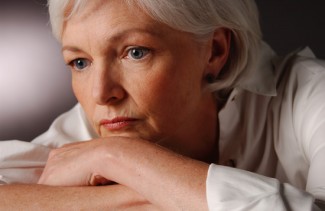Tips for Diagnosing and Treating Anxiety in Elderly People

We live in a time where mental health issues like anxiety disorders are being taken more seriously as the illnesses that they are. Real progress has been made in recent years in reducing the mental health stigma surrounding anxiety. We're talking about it more and learning to treat anxiety better. There's also an overall softening of social attitudes about it.
Anxiety disorder is the most common form of mental illness, and people are finally starting to recognize the devastating impact it can have on parents, children, families, and friends. Except, one population with a huge increase in anxiety diagnoses is being neglected: anxiety in elderly people.
More Elderly People Are Being Treated for Anxiety
Anxiety disorders in elderly people are on the rise -- they are now twice as common as the "geriatric giant" dementia and up to eight times more common than major depressive disorders for older adults. 90% of late-life anxiety comes in the form of generalized anxiety disorder (GAD), or a specific phobia like agoraphobia. GAD makes up at least 50% of all new anxiety diagnoses for older adults.
Why Diagnosing and Treating Anxiety in the Elderly is More Difficult
Even though lots of older adults are suffering from anxiety, many are not getting the help they need. Some of the reasons may come down to ageism; the healthcare industry tends to focus on physical rather than the mental illness in older people. However, diagnosing anxiety in elderly patients can also be more difficult for a variety of reasons, including:
- Comorbidity with other medical conditions -- Some medical problems common to older adults (like heart disease) can have anxiety-like symptoms that mask and overshadow actual anxiety symptoms, such as chest pain or shortness of breath.
- Older people tend to somatize psychiatric problems -- This means that elderly patients are more likely to focus on the physical symptoms of anxiety rather than the emotional problem itself. Anxiety often presents itself differently in older people, possibly because of the generational stigma around talking about emotional problems.
- Older adults often take more medications -- Older people tend to be on more medication than younger people, and, like comorbid medical conditions, some medication can mask the symptoms of anxiety disorder.
Tips for Effectively Diagnosing and Treating Elderly Anxiety
 Elderly people present anxiety differently, and they often respond differently to treatment as well. Below are some suggestions for achieving effective diagnosis and treatment of anxiety in elderly people:
Elderly people present anxiety differently, and they often respond differently to treatment as well. Below are some suggestions for achieving effective diagnosis and treatment of anxiety in elderly people:
- Start with a primary care physician. For addressing anxiety issues with the elderly, the first stop should be your primary care physician or main healthcare provider. There are two reasons for this: first, your doctor needs to make sure the anxiety isn't the result of physical illness, and second, most older people feel more comfortable talking to someone they're already familiar with about mental health issues.
- A good intake history is important. It's key that all information about prior medical history be examined carefully when treating elderly people for anxiety. It's important to know whether it's a new-onset condition, a comorbid condition related to an ongoing disorder, or a medication side effect. This is another reason why it's best if elder anxiety is treated by someone already familiar with the person's medical situation.
- Start anxiety medications at lower doses. If anxiety medications or antidepressants are indicated for treatment, your doctor may decide to start with one-half or even one-quarter the normal dose. This is because aging people with possible pre-existing medical conditions often react differently than their younger counterparts. Also, non-benzodiazepine medications like buspirone (Bu Spar) may be indicated.
- Consider cognitive behavioral therapy (CBT). CBT is widely considered the most effective drug-free treatment for anxiety disorder, and research indicates modified CBT programs can help treat anxiety in elderly people. Your doctor may be able to make some suggestions about this too.
Elderly people deserve accurate diagnosis and effective anxiety treatment like everyone else, but, unfortunately, do not always receive it. If you, or your loved one, is living with untreated anxiety, your doctor can point you in the right direction. Effective treatment options for elderly people with anxiety do exist, so make sure you speak up.
Sources for statistics:
- Regier DA, Boyd JH, Burke JD, et al. One month prevalence of mental disorders in the US—based on five epidemiologic catchment area sites. Arch Gen Psychiatry 1988;45:977-86
- Krasucki C, Howard R, Mann A. Anxiety and its treatment in the elderly. Int Psychogeriatr 1999;11:25-45
- Ferretti G. Anxiety and Alzheimer's disease. J Geriatr Psychiatry Neurol 2001;14:52-8
You can find Greg on his website, Twitter, Google+, Pinterest, and Facebook.
APA Reference
Weber, G.
(2015, January 15). Tips for Diagnosing and Treating Anxiety in Elderly People, HealthyPlace. Retrieved
on 2025, December 24 from https://www.healthyplace.com/blogs/treatinganxiety/2015/01/tips-for-diagnosing-and-treating-anxiety-in-elderly-people
Author: Greg Weber
Aside from being weak physically, old folks tend to feel inferior too, worsening their already bad conditions. And so, it is really essential to pay attention to the seniors. Talk to them, listen to them and provide them their needs and wants. Having a medical professional come and check on them would be great too.
I'm so greatful to have found this website! It's tremendously encouraging to have found it at this time of my life and I thank you. I developed panic disorder a few years ago, following generalized anxiety. Just as I was beginning to improve through the use of CBT and meditation techniques, my dearest sister committed suicide, seven months ago. Ironically and sadly, she was the "rock" our family looked to. So when people say that one just needs to "toughen up" and just get over anxiety, here again is proof that it can kill.
I'm taking Xanax and anti-depressants, but since getting fired from my job of eight years last September, things are really up and down. More than anything else, daily meditation and mindfulness, staying in the "now" of each moment, is helping to improve my outlook towards job hunting, and becoming less toxic to those around me. It also helps to utilise visualization, bringing images of safety, beauty and comfort to mind, as a way of retraining neural circuitry.
I look forward to reading more of these post and once again, thank you!